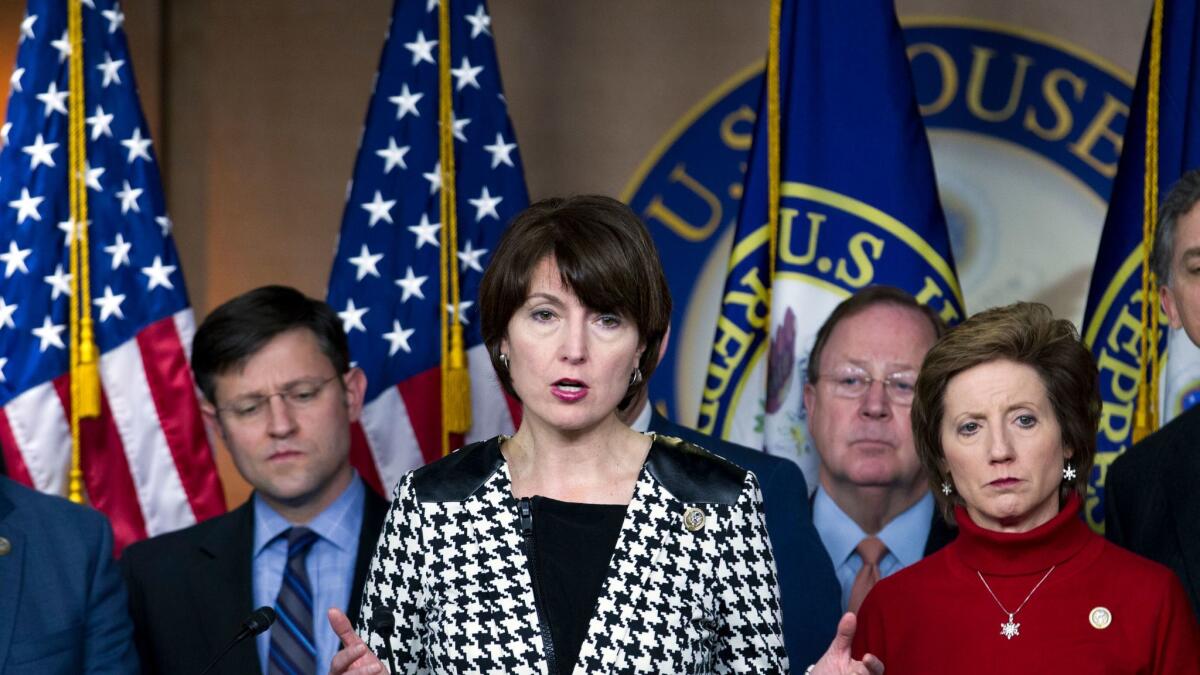They love Trump, but will they vote in November if he’s not running? Control of Congress is at stake

- Share via
Reporting from Spokane, Wash. — Dan Karr had little use for politics until Donald Trump came along and captivated the small-business owner with his wrecking-ball candidacy.
Karr has grown even more supportive since Trump became president. “He’s actually doing what he said he would do, which is unusual,” the rangy 57-year-old marveled. Things like cutting taxes and rolling back government regulations.
But Karr’s enthusiasm doesn’t translate into excitement over November’s midterm election — he may or may not vote — and that’s a problem for Republicans fighting to keep their majorities on Capitol Hill.
The Republican faithful reliably cast their ballots, noted Stuart Elway, a Seattle pollster who has spent decades sampling public opinion here in Washington state. But will Trump voters who aren’t as politically engaged turn out for an election with no Trump on the ballot?
“Where are they going to be?” Elway asked. “That’s the million-dollar question.”
The answer could very well determine control of Congress.
The halfway point of a president’s first term is typically a rough one for the party in the White House. The last two midterm elections, under President Obama, were terrible for Democrats, who lost scores of seats along with their majorities in the House and Senate.
One big reason was indifference: Voters who surged to the polls to vote for the nation’s first black president stayed home in 2010 and again in 2014 when Obama wasn’t running.
Republicans, mindful of political history, say they have built the most extensive voter contact and persuasion operation ever, to ensure no potential GOP backer sits out November and to shield incumbents like the local congresswoman, Cathy McMorris Rodgers.
“We know who they are and we have the army of volunteers to be able to get out there, find them and bring them to the polls,” said Rick Gorka, a national Republican Party spokesman. “We know which buttons to push, what’s needed to motivate them.”
America First Action, a pro-Trump organization, hopes to raise $100 million to help coax the president’s supporters to the polls nationwide. “It’s not just about an election,” said the group’s president, Brian O. Walsh. “It’s about the agenda and keeping people engaged in the fight.”
But mobilizing voters turned off by politics, who supported Trump precisely because he’s so outside the norm, who may not like Congress regardless of which party has control, will be a challenge.
We know which buttons to push, what’s needed to motivate them.
— Rick Gorka, a Republican Party spokesman, on prodding Trump voters to the polls in November
For Karr, campaigns below the presidential level never seem to matter much.
The eastern half of Washington, where he makes his living remodeling homes, is rural, conservative and routinely outvoted by left-leaning Seattle and its far more crowded environs. “We’re helpless,” Karr said. “We get this stuff shoved down our throats, even though we don’t want it.”
McMorris Rodgers, 48, would normally be a shoo-in for reelection. She’s rooted in agriculture, one of eastern Washington’s biggest industries, having grown up on an apple orchard, and hasn’t faced a serious challenge since she was first elected in 2004.
But the president’s unpopularity — his national approval hovers around a limp 40% — has compounded the difficulties facing Republicans of every stripe; few have yoked themselves as closely to Trump as the ambitious seven-term congresswoman.
She not only votes the president’s way nearly 100% of the time but vigorously promotes his policies as the No. 4 Republican in the House leadership, becoming, as the Seattle Post-Intelligencer described her, “the face of the Trump administration in Washington state.”
While Trump carried McMorris Rodgers’ district, he did so with just 50% support. Now even some Trump voters say the seven-term congresswoman has become too partisan.
“I think she doesn’t think for herself. I think she votes the party line too often,” said Republican Jeff Holland, 46, who sells farm equipment in Spokane.
He backed Trump for the sole purpose of preserving a conservative majority on the Supreme Court and, now that Neil Gorsuch is seated, doesn’t much care about November, figuring Congress “is pretty much a stalemate” regardless of which party runs the place.
Pausing at the recent Spokane Ag Expo, Holland expressed a view others shared: McMorris Rodgers has grown out of touch.
“I don’t think she comes back and talks to us enough,” he said, amid the shiny display of giant tractors, combines and sprayers. “What’s happening on the ground is a lot different from Washington.”
McMorris Rodgers declined to be interviewed. But a campaign spokeswoman, Ashley Stubbs, said the lawmaker is “back home in the district all the time and the policies that she’s passing are in step with the priorities of her constituents here.”
“Cathy’s midterm elections in 2010 and 2014 show that she has broad support, whether it’s a [presidential election] year or an off year,” Stubbs said. “She has gotten 60% or higher of the vote every year since 2008.”
Democrat Lisa Brown, 61, who spent two decades representing Spokane in the state Legislature, is McMorris Rodgers’ chief opponent. She’s no Trump basher, though she criticizes administration policies — such as repealing Obamacare — that she believes hurt the district. Rather, Brown seizes on the notion the congresswoman has “gone Beltway.”
“She is very tied, especially now, to the agenda of her party’s leadership,” Brown said over coffee at a hipster cafe downtown. “Politics is local. I think people want a representative that is actively listening to them.”
It sounds familiar.
In 1994, Democratic Speaker Tom Foley was swept away in the district by an opponent whose slogan — “We need a listener, not a speaker” — captured the same sense of frustration and neglect. (It was the first such ouster of a party leader in 130 years.)
Nationally, the GOP picked up 54 seats that year, more than enough to take control of the House as Democrats stayed home and Republicans turned out in huge numbers to rebuke President Clinton.
McMorris Rodgers remains a favorite to win reelection, given the district’s conservative tilt. “I think she’s doing a decent job,” said Jessica Hoard, 31, who helps manage a seed company in Davenport, farm country about 35 miles west of Spokane. Certainly better than the rest of Congress, whose members only seem interested in reelection, Hoard said.
But there is enough concern that the Congressional Leadership Fund, House Speaker Paul D. Ryan’s political action committee, has parachuted into the district to help boost McMorris Rodgers’ prospects.
While there is no reliable data on the race, national polls have found tremendous enthusiasm among Democrats eager to vote in November and considerably less among Republicans.
Liberal Democrats seem particularly motivated: More than 8 in 10 said they were looking forward to the midterm election, according to a recent Pew poll, compared to 61% of conservatives. Roughly the opposite was true when Obama and fellow Democrats were clobbered.

It’s not hard to find those lukewarm GOP sentiments in this wide-open corner of Washington, where endless acres of farm and ranch land give way to the sloping start of the Rocky Mountains.
Gary Beal, 65, is plenty glad he helped elect Trump who, he said, has brought a businessman’s sensibility to the White House. But he doesn’t see any urgency in the midterm election.
“I usually try to vote,” said Beal, a retired fish and wildlife officer who raises cattle on a hobby ranch outside Spokane. “But it’s not the end of the world if I don’t.”
For some Trump voters, the November election pales next to the excitement of 2016. “The hoopla kind of already happened,” Chris Nelson, 41, said between errands in Spokane Valley, where a black-and-white Vietnam POW flag flapped briskly outside the post office.
Republicans hope to overcome that sentiment and spark some energy among the Trump faithful by summoning a familiar scourge.
“What’s at stake is Nancy Pelosi becoming speaker of the House again and not getting President Trump’s agenda passed,” said Jesse Hunt, a spokesman for the GOP’s congressional campaign arm. “If Pelosi’s in charge… it’s not going to bring about all this change people want.”
But instilling that sense of urgency will take some convincing.
William Lyons, 29, who grows hay on 400 acres outside Odessa, said voting for Trump made him feel part of something big and important, “a movement” that was about more than one man.
“When it comes to congressional voting, you’re voting for that one person,” Lyons said, and he’s no great fan of McMorris Rodgers. “She’s hardly ever here,” Lyons said.
He is, however, inclined to vote for Trump again in 2020.
More to Read
Get the L.A. Times Politics newsletter
Deeply reported insights into legislation, politics and policy from Sacramento, Washington and beyond. In your inbox three times per week.
You may occasionally receive promotional content from the Los Angeles Times.











